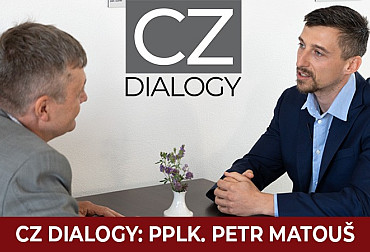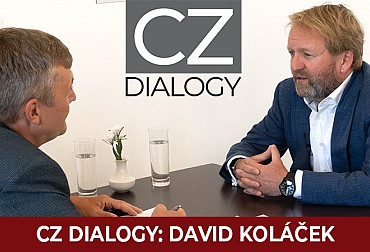Jan Kofroň: Defence is not something that concerns only a very small group of people
The groundbreaking government document called the Czech Defence Strategy 2023 sets out what needs to be done to make our country's defence strong and reliable. At the same time, it points towards a society-wide approach to defence, as we see today in Ukraine and Israel, for example. This is essentially a necessary condition for the document to work. We were interested in whether Czech society is sufficiently aware of possible threats and whether it is prepared for them, but this time we did not look at the problem from the point of view of the army or the Ministry of Defence, but from a political and social point of view. That is why this time we have invited the deputy head of the Department of Political Science, Faculty of Social Sciences, Charles University RNDr. Jan Kofron, Ph.D. to our discussion show CZ DIALOGUES.
Video: Interview with the Deputy Head of the Department of Political Science, Faculty of Social Sciences, Charles University RNDr. Jan Kofroň, Ph.D. / CZ DEFENCE
The guest of this episode of CZ DIALOGUES is a graduate of the Faculty of Science of Charles University in the field of Geography and Cartography, he also graduated from the Master's and PhD programme in Regional and Political Geography. Since 2013, he has been the coordinator of the Bachelor's programme Politics and International Relations at the Faculty of Social Studies of Charles University. His research interests include issues related to factors affecting military effectiveness and international relations predictions and theories. He has been instrumental in the introduction of the elective course "Practice with the Czech Army (Active Reserve)", in which students of the Faculty of Social Sciences of the UK can earn credits for participating in exercises as members of the Active Reserve.
Regarding the Defence Strategy of the Czech Republic 2023 mentioned in the introduction, Jan Kofroň believes that society must know the basic starting points and at the same time be aware that defence is not something that concerns only a very small group of people, such as professional soldiers or officials in the Ministry of Defence. "We cannot perceive that society and defence are two, let's say, completely incompatible things," Kofroň says. He sees the army's efforts to connect with the scientific and academic community as important. "General Rehka tries to be in contact with people from the academy, with the understanding that this also applies to people from the Faculty of Social Sciences. It's definitely a shift from the previous period. Not that the military was somehow anti-academic before, but of course you can see the interest here. At the same time, we are at the beginning of the process," says Kofroň.

In our CZ DIALOGUES programme we had the opportunity to discuss the concept of "national defence" from an economic point of view with Petr Sklenář, Chief Economist of J&T Bank. According to political scientist Kofron, it doesn't matter whether we look at it from the perspective of an economist or a political scientist: "Of course, there will probably be some points that are a bit more pointed out. From my position, it's crucial for defence anyway at the end of the GDP level. Poor countries are not able to generate strong armies in the long run. Technologically advanced armies can of course have large numbers of people and then lose them in various ways. While I am primarily a political scientist, I would say that the economic base is extremely important. I don't think I would differ much from my fellow economists on this. Likewise, I would say that at least some subset of the defense industry is simply essential. You can't buy everything, especially in a crisis, on international markets. Of course, that does not mean that we have to have a defence industry like we had in the 1970s, for example. That will never come back. What I would perhaps emphasise more is the question of alliances. It is perhaps also a question of, let's say, basic social unity or basic social consensus that it makes sense to defend this country," Jan Kofroň says in the interview.
Historical parallels, especially from the 1920s, have been recalled relatively often recently. However, according to Kofroň, these are not entirely valid. "The balance of power in Europe is not as extremely skewed as it was then. On the other hand, of course, I can imagine that in the US, for example, they will elect a president who will tend to, say, abandon NATO or diminish its importance. And that would be very extreme for us, of course, and we would then be approaching some scenario from the 1920s and 1930s. I say close, I don't think we would be there," emphasises Jan Kofroň, who also adds: "If you think about how many times we remember 1938, to some extent it's okay. At the same time, it seems that appeasement never works. But it doesn't. It's just that in many situations appeasement was a relatively reasonable strategy for the powers in question, there was no war. Maybe in ten, fifteen, twenty years, when some new crisis comes, maybe appeasement will be a sensible strategy, and sometimes, on the contrary, it will only make the situation worse. Of course, that is very difficult to predict."
An important part of the public debate are security and defence issues, or the currently publicly discussed modernisation purchases for the army. According to Jan Kofron, it is difficult to have a public discussion because these topics are extremely emotionally charged. "Let's take the F-35 debate for example. Some, let's say, techno-economic debate has become a strange and over-hyped debate. I think people are absolutely incompetent, they have very often extremely strong opinions about it. And that's not to take away anyone's opinion for or against the Gripen or the F-35. The debate is sometimes completely lacking in reason in my opinion, but it is emotional. Everybody can imagine that plane. But if we were talking about smaller things, like how much artillery ammunition we have in our stockpile, which is proving to be a pretty crucial thing in Ukraine right now, then nobody really cares about those ammunition crates. But sometimes the smaller things are much more important than the bigger ones," says political scientist Jan Kofroň, who adds that the main things come when the crisis hits. Why? Because we are living in extremely turbulent times compared to the previous three decades."
We were interested in the extent to which the communication solution for major acquisitions is important in the form of effectively conducted strategic communication by state institutions, the Ministry of Defence, the government, setting priorities and topics so that the company has good initial information. According to Jan Kofron, the extensive speculation on social media and the debate that is being conducted outside the traditional media space is a disappearing role of the traditional media, where the traditional channels that would somehow moderate the debate and, let's say, even select those who comment on it, are really disappearing. "Even if, for example, Czech Television or private TV stations or platforms try to somehow grasp the debate in a professional way, you still see at the end that the "buzz" on social media, which often many times trumps, let's say, traditional channels. I may be a little skeptical about what the ministry can do on this. It can try to communicate some things more," says Jan Kofroň.

It is also important to see the problem of communicating the purchase of strategic armaments for the army in context and environment. "For example, when the Finns acquired the F-35, it was a seven-year decision-making process. It was a very thorough selection process, and in the end they decided on the F-35 for a number of reasons. And I don't think anybody in Finland doubts that that selection was, shall we say, very rational. What happened here was that the renewal of the fighter air force was, of course, considered. But that was before the war. The war came, there were enormous pressures on production capacity. The government was in a situation where it had to make a decision relatively quickly. I think it is a good thing that it has made the decision now rather than if it had postponed the decision for, say, a year and a half, because then it would have been subject to an election fight and nobody knows how the election will turn out and how long it will take to form a new government. Given the delivery times, it could also happen that we would not see the planes for another ten years. This is a bit of a specific situation. But I certainly agree that, at least in the most gigantic contracts, some things could have been communicated better. However, the army has been trying to communicate more and more in the last five years or so," says Jan Kofroň, Ph.D., deputy head of the Department of Political Science, Faculty of Social Sciences, Charles University, with whom we discussed other interesting topics. If you want to learn more, listen to the full interview at the beginning of this article.





















